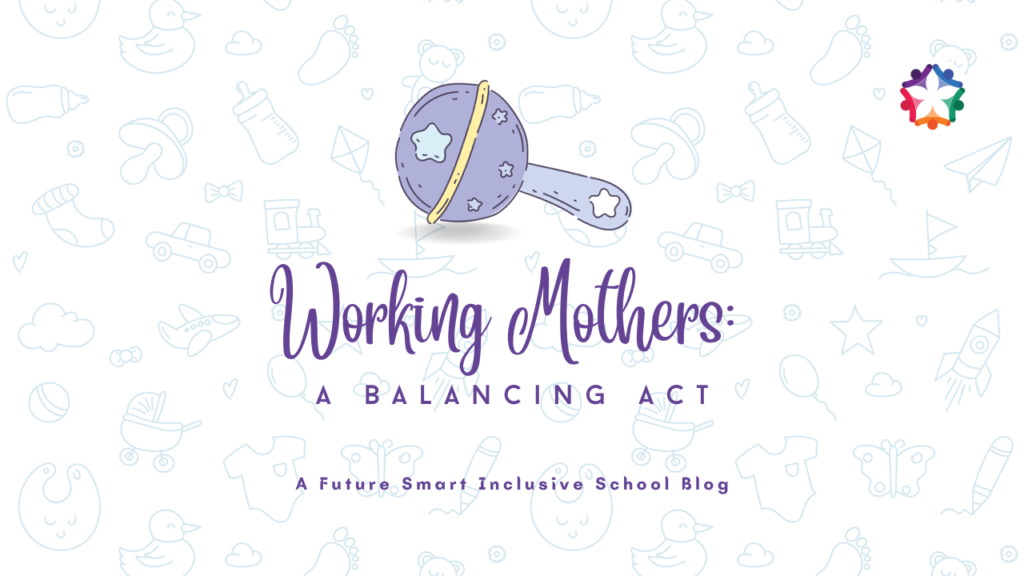Working Mothers: A Balancing Act

For millions of working mothers, balancing a career and family can be a daily juggling act. Striking a balance in both these spheres can be fulfilling and challenging at the same time.
Working Mothers vs Stay-at-Home Moms
The debate about raising better children has spurred a significant battle. The Mommy wars are very real. And it’s not new. The age-old battle about stay-at-home moms vs working mothers has been raging since at least the 90s. The usual rejoinder has been the absence of working mothers. But as an entire generation raised by working mothers reached adulthood in the past few years, researchers have more data to work with. The results are only now becoming apparent, with facts leaning in favour of working mothers.
Women’s inclusion in the workforce has a positive impact on the economy and the overall well-being of women themselves. The belief that women – as mothers – should only focus on child care is crumbling before our eyes. A mounting body of research now points towards the many good things that happen to children of working mothers. For example, a child whose mother is part of the workforce has better employment prospects¹. This blog aims to shed light on the mothers who have chosen to balance home and work.
Feelings of Guilt
Many mothers struggle to maintain an equilibrium between their parental role and career. This difficult juggling act is often packaged with the heavy burden of guilt – a sentiment shared by numerous career moms. Working mothers constantly question whether they are doing enough for their children as they endeavour to excel in their professional lives.
Born out of a desire to provide a secure and loving environment for their kids and pursue their own dreams, the working mom’s guilt is complex. It often exacerbates societal expectations and attitudes, leaving mothers torn between two worlds.
Working Mothers Have a Positive Influence on Their Kids
Public discourse about working moms is often critical of the mothers because children get to spend less time with parents. However, contrary to popular belief, a 2014 study revealed that mothers with a college degree spent more time with their children on activities that required active engagement. This means that whatever was lost in terms of quantity of time, they made up in quality.
A 2018 study found that working moms positively influence their children (male and female) when they become adults. The positive outcomes of having a mother with a career are not apparent early on, but they usually become clear in adolescence and adulthood. The same study revealed that daughters who grew up with a working mother held senior and supervisory positions in their jobs and earned higher incomes. However, sons of working mothers were better at caring for family members and other domestic duties compared to sons raised by stay-at-home moms². This is a win-win situation.
How Does Having a Working Mother Help Children
Finding balance between the children and a career is complex. Mothers often feel guilt and resentment about missing out important things. But they also make up for it in areas that matter.
Working mothers are good role models for their children. Children learn many things as they watch their mothers successfully find her way across this complex landscape. Not only do they learn about good management, but also about being successful in the workplace. Children also learn time management, professionalism, and to juggle priorities.
Children of working moms become independent earlier. They learn to care for themselves and perform everyday tasks. With early years education now focussed on age-appropriate self-help tasks and independence, kids of working moms already have a head start in this department.
Striking a Balance
From managing work to overseeing children’s activities and homework, there are many demands on a mother’s time and energy. There are strategies and tips that can help working mothers overcome the behemoth challenge of balancing work and family responsibilities.
Prioritizing and Organizing
Prioritizing is step one to creating balance between work and family. Creating to-do lists for both work and family responsibilities helps put things in perspective. Identify critical tasks that must be completed each day. Be realistic about what can be accomplished and do not overcommit. Once priorities and the order of importance for the task have been set, it becomes easier to manage time and reduce stress.
Create Boundaries
Separating work and family is difficult when your career and children demand your attention. Creating boundaries is essential to maintaining work-life balance. This might mean setting specific hours for work and sticking to them, or turning off work email and notifications when at home. Be fully present and avoid work-related phone calls or emails when you spend time with family. This is what quality time looks like. When you are at work, be fully present and avoid personal phone calls or errands (except emergencies).
Communication
Communication is key to balancing work and family. This helps everyone understand expectations and reduces conflicts. Communicate with your employer about your needs and limitations. Also, talk to your family about your work schedule and responsibilities.
Ask for Help
Asking for help is not a sign of weakness. It is an acknowledgement that balancing work and family is a team effort. Maintain good relations with your extended family so you can reach out to them for assistance with childcare or other tasks. As your children get older, delegate tasks to your children.
Self-Care
Never ignore self-care. Mental and physical health are both important. This means making time for yourself, such as exercise or hobbies. Caring for yourself can help you manage stress and have more energy and patience for your family and career.
References
¹ Having a Working Mother Is Good For You (https://www.hbs.edu/news/releases/Pages/having-working-mother.aspx)
² Learning from Mum: Cross-National Evidence Linking Maternal Employment and Adult Children’s Outcomes (https://journals.sagepub.com/eprint/DQzHJAJMUYWQevh577wr/full)




Leave a Reply